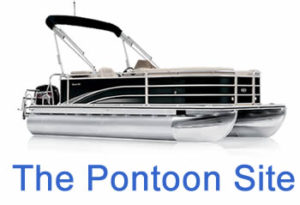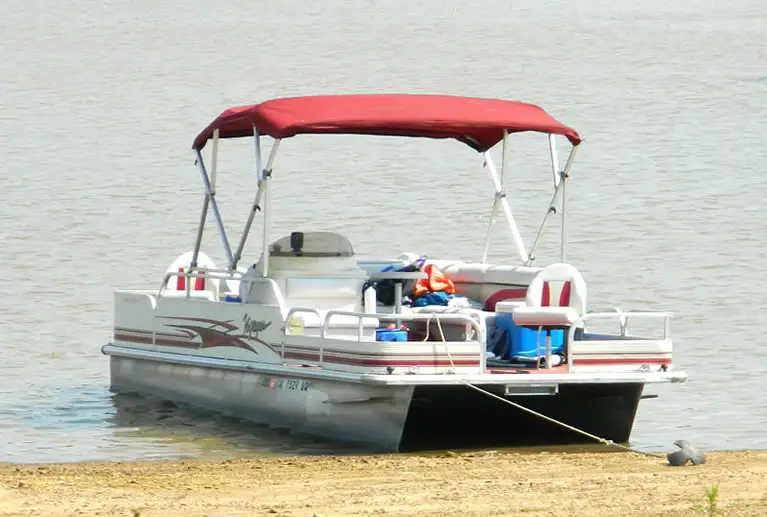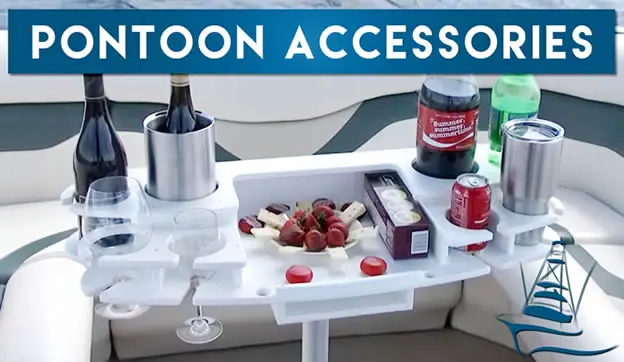One of the best things about pontoon boats is the comfort with which you can cruise your favorite body of water. These vessels are a great vessel for entertaining, angling and water sports. But to get the most out of your pontoon boat you need to be able to anchor your boat safely and effectively. But what is the best anchor for a pontoon boat?
The best anchor for a pontoon will depend on where you are boating.
- For weed and grass bottoms a plow anchor works best.
- A mushroom anchor offers better hold in mud and sand bottoms.
- For rocky bottoms a Danforth anchor is the best choice while shallow waters will only require a lightweight grapnel or sand anchor.
- If you move your pontoon boat regularly to different areas and only want one anchor to cover all types of bottom then a plow or bow anchor is the best choice.
Although there are many different pontoon boat accessories by far the most important accessory on your boat is the anchor.
Contents
- The only anchor types that work for a pontoon boat
- The 6 best anchors for a pontoon boat & the 3 best anchor rods
- Plow anchor for a pontoon boat & when it is best used
- Box anchor for a pontoon boat & when it is best used
- Mushroom anchor for a pontoon boat & when it is best used
- Danforth/fluke anchor for a pontoon boat & when it is best used
- Claw/Bruce anchor for a pontoon boat & when it is best used
- Grapnel anchor for a pontoon boat & when it is best used
- Best anchor materials
- The 3 best rodes for a pontoon boat anchor
The only anchor types that work for a pontoon boat
Pontoon boats are used for a variety of things and therefore can be found in a variety of different water bodies. The type of anchor you use for your pontoon boat will be one that has been designed to be ideally suited to type of bottom you will set it in.
When you think of an anchor, perhaps the old Admiralty style anchor springs to mind, but these are old style anchors that are rarely used these days as they are heavy and often difficult to stow, especially in a recreational boat.
With a lightweight vessel like a pontoon boat you need an anchor that offers great hold, with no drift, but without the cumbersome weight that comes with old-school anchors. Also, you need to be able to retrieve your anchor readily, and not having a fully manned pirate frigate means you need something that is lightweight and easy to retrieve.
There are many types of anchors available and so choosing the best anchor for a pontoon boat will probably be a mixture of personal preference and technical performance.
There are anchors that are best suited to specific marine environments and if your pontoon boat is used in the same waters every time you go boating it is probably best to choose an anchor suited to the bottom of that specific body of water.
Contemporary designs are also available and some anchors are made with specialist materials such as high grade steel with special coatings and finishes such as PVC or vinyl.
Some mariners recommend that you keep a spare anchor aboard your boat, much like a spare tire in a road vehicle, in case you lose your anchor or have to cut it lose in an emergency.
If you decide to stow a spare anchor then my advice is to choose a main anchor that is best suited to the type of water bodies you usually boat in, so you have superior hold, and have a more generic type anchor as a spare. This means should you ever decide to boat in different waters you will have an appropriate anchor to use regardless of where you are.
Most popular pontoon boat anchors at a glance
Some classic examples of anchors designed for specific water bottoms and that are ideal for pontoon boats are:
- The Plow anchor. For grasses and weeds.
- The Box anchor. For mud and sands.
- The Mushroom anchor. For most bottom types.
- The Danforth or fluke anchor. For rocky bottoms.
- The Claw or Bruce anchor. Also for rocky bottoms.
- The Grapnel anchor. For firm shallow bottoms.
Let’s look at the above anchors in more detail to see which one is best suited for your pontoon boat.
The 6 best anchors for a pontoon boat & the 3 best anchor rods
Plow anchor for a pontoon boat & when it is best used
For bottoms that are overgrown with grasses and weeds the plow anchor is a superior choice.
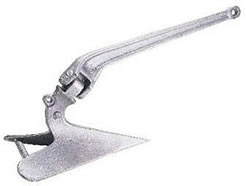
This anchor also offers a firm hold on most other bottoms as well being the best choice for grassy bottoms.
However, many boat owners complain that this particular anchor is not easy to handle or stow due to its size and its weight.
Box anchor for a pontoon boat & when it is best used
The box anchor pops open when deployed and provides a large surface area for gripping most bottoms but gives the best firm hold when used in mud and sand.
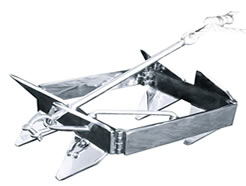
The box anchor makes a great generic anchor.
Mushroom anchor for a pontoon boat & when it is best used
The mushroom anchor is typically used for anchoring buoys because it has such great hold but this superior hold comes at a price.
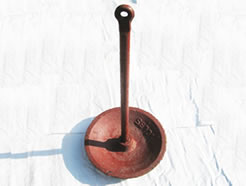
A mushroom anchor may be difficult to retrieve if it takes a firm hold at the bottom.
Danforth/fluke anchor for a pontoon boat & when it is best used
The Danforth, or fluke, anchor is a very common type seen on pontoon boats that are used in water bodies with very rocky bottoms as it sets well in these environments.
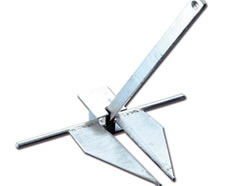
A Danforth anchor has the added benefit of being lightweight and so is a big favorite with many pontoon boat owners..
Claw/Bruce anchor for a pontoon boat & when it is best used
The Bruce, or Claw, anchor offers great hold in rocky bottoms while being easy to retrieve.
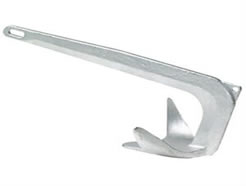
The claw anchor is probably the most well known type of anchor. Although it performs best in rocky bottoms it will offer good hold in most bottom types.
Grapnel anchor for a pontoon boat & when it is best used
Grapnel anchors perform best in shallow water.
These anchors are lighter than most and have folding options because they need less holding power in shallower waters.
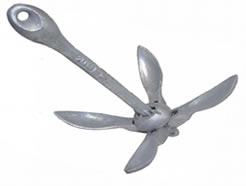
Grapnel anchors work to corkscrew themselves into a firm shallow bottom.
Best anchor materials
Pontoon boat anchors do not only come in a variety of types but they also come in different materials.
The most popular material for all boat types is mild steel, high-tensile steel, stainless steel, and aluminum.
The most common metal used to construct boat anchors is steel. This steel will be either mild or high tensile steel.
Although these two steels look very similar and will be almost indistinguishable to the untrained eye they do have different properties.
High tensile steel is at least two times stronger than mild steel and sometimes as much as three time stronger.
However this does not translate into three times the holding power if you choose a high tensile steel anchor over a mild steel one. It just gives you a longer lasting anchor.
Both mild steel and high-tensile steel anchors are not corrosion-resistant and therefore need to be galvanized to prevent rust and other corrosion especially in saltwater.
Most anchors of this type will come galvanized when you buy them. This is also true of aluminum anchors which do fair well in saltwater. Saltwater is highly corrosive to aluminum.
Aluminum may be weaker than steel but it is much lighter and so anchors made from aluminum tend to be easier to handle. The same is true of stainless steel anchors.
In freshwater corrosion is much less pronounced and therefore the type of material for an anchor is less important.
The 3 best rodes for a pontoon boat anchor
Should you use chain or rope for your anchor rode/cable?
That is a question that is often asked by pontoon boat owners. So, let’s take a look at these materials to see which one works best as an anchor cable.
A nylon anchor rode is for lightweight elasticity
Nylon rode is the most common type of anchor cable used because it is lightweight and has great elasticity.
A nylon rode, because it is lightweight, is easy to stow and haul and the elastic properties of the nylon mitigate the stress of peak loads on the anchor which provides a more secure hold.
Nylon rode is usually sold as either twisted or braided rope.
Twisted nylon rope is the cheaper type but it is also more elastic and easier to splice.
However, braided rope is much stronger and takes less of a toll on your hands. Some pontoon boat owners prefer how it looks as well.
The downside to using nylon rode is that it does not hold up well to bottom abrasion and does not hold down your anchor line.
Holding down your anchor line is important in order to maintain the optimum horizontal angle of force at which the anchor is going to perform its best (I know I hate all that technical stuff too but it’s important).
So is chain a better option?
A chain anchor rode is better for more challenging conditions
A chain rode addresses the problems encountered when using a nylon rode but comes with its own challenged.
Chain is heavy and difficult to handle. It is also more difficult to store and it looks awful onboard a stylish, high-class pontoon boat.
So what’s the alternative if you want the functionality of chain but the ease-of-use and looks of nylon?
A combined nylon and chain anchor rode give you the best of both worlds
One way to gain the benefits of using chain, while mitigating the disadvantages as much as possible, is to add a length of chain to a nylon rode.
The section that contains the chain should equal the length of your boat.
However, even adding a length of chain to the rode that is only half the length of your pontoon boat has its benefits and will give your anchor extra hold.
As most pontoon boats are used in calm water a simple nylon rode is probably all you will ever need though.
Be sure to also read our article on how to anchor a pontoon boat safely and effectively and where to anchor your pontoon boat.
